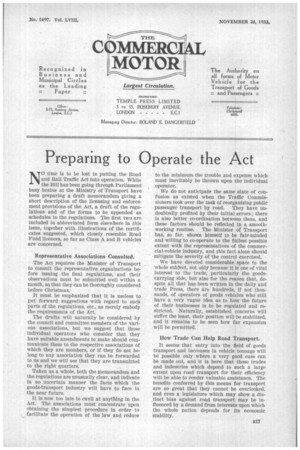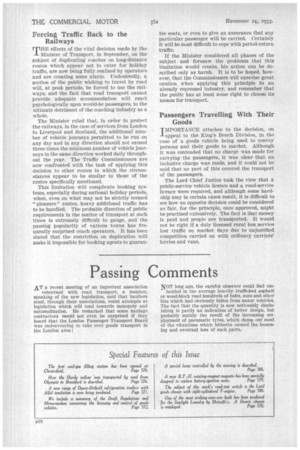Preparing to Operate the Act
Page 27

Page 28

If you've noticed an error in this article please click here to report it so we can fix it.
NO time is to be lost in putting the Road and Rail Traffic Act into operation. While the Bill has been going through Parliament busy brains at the Ministry of Transport have been preparing a draft memorandum giving a short description of the licensing and enforcement provisions of the Act, a draft of the regulations and of the forms to be appended as schedules to the regulations. The first two are included in abbreviated form elsewhere in this Issue, together with illustrations of the certificates suggested, which closely resemble Road Fund licences, so far as Class A and B vehicles are concerned.
Representative Associations Consulted.
The Act requires the Minister of Transport to consult the representative organizations before issuing the final regulations, and their observations must be submitted well within a month, so that they can be thoroughly considered before Christmas.
It must be emphasized that it is useless to put forward suggestions with regard to such parts of the regulations, etc., as merely embody the requirements of the Act.
The drafts will naturally be considered by the council and committee members of the various associations, but we suggest that those Individual operators who consider that they have suitable amendments to make should communicate them to the respective associations of which they are members, or if they do not belong to any association they can be forwarded to us and we will see that they are transmitted to the right quarters.
Taken as a whole, both the memorandum and the regulations are unusually clear, and indicate In no uncertain manner the facts which the goods-transport industry will have to face in the near future.
It is now too late to cavil at anything in the Act. The associations must concentrate upon obtaining the simplest procedure in order to facilitate the operation of the law and reduce to the minimum the trouble and expense which must inevitably be thrown upon the individual operator.
We do not anticipate the same state of confusion as existed when the Traffic Commissioners took over the task of reorganizing public passenger transport by road. They have undoubtedly profited by their initial errors ; there is also better co-ordination between them, and these factors should be reflected in a smoothworking routine. The Minister of Transport has, so far, shown himself to be fair-minded and willing to co-operate to the fullest possible extent with the representatives of the commercial-vehicle industry, and this fact alone should mitigate the severity of the control exercised.
We have devoted considerable space to the whole subject, not oftly because it is one of vital interest to the trade, particularly the goodscarrying side, but also for the reason that, despite all that has been written in the daily and trade Press, there are hundreds, if not thousands, of operators of goods vehicles who still have a very vague idea as to how the future of their businesses is to be regulated and restricted. Naturally, established concerns will suffer the least, their position will be stabilized, and it remains to be seen how far expansion will be permitted.
How Trade Can Help Road Transport.
It seems that entry into the field of goods transport and increases in vehicle tonnage will be possible only where a very good case can be made out, and it is here that those trades and industries which depend to such a large extent upon road transport for their efficiency will be able to render valuable assistance. The benefits conferred by this means for transport are so great that they cannot be overlooked, and even a legislature which may show a distinct bias against road transport may be influenced by a demand from interests upon which the whole nation depends for its economic stability.
Forcing Traffic Back to the Railways
TliE effects of the vital decision made by the Minister of Transport, in September, on the subject of duplicating coaches on long-distance routes which appear not to cater for holiday traffic, are now being fully realized by operators and are creating some alarm. Undoubtedly, a section of the public wishing to travel by road will, at peak periods, be forced to use the railways, and the fact that road transport cannot provide adequate accommodation will react psychologically upon would-be passengers, to the ultimate detriment of the coaching industry as a whole.
The Minister ruled that, in order to protect the railways, in the case of services from London to Liverpool and Scotland, the additional number of vehicle journeys permitted to be run on any day and in any direction should not exceed three times the minimum number of vehicle journeys in the same direction worked daily throughout the year. The Traffic Commissioners are now confronted with the task of applying this decision to other routes in which the circumstances appear to be similar to those of the routes specifically mentioned.
This limitation will complicate booking systems, especially during national holiday periods, when, even on what may not be strictly termed " pleasure " routes, heavy additional traffic has to be handled. The probable direction of public requirements in the matter of transport at such times is extremely difficult to gauge, and the passing popularity of various towns has frequently surprised coach operators. It has been stated that the restriction on duplication will make it impossible for booking agents to g-uaran tee seats, or even to give an assurance that any particular passenger will be carried. Certainly It will be most difficult to cope with period-return traffic.
If the Minister considered all phases of the subject and foresaw the problems that this limitation would create, his action can be described only as harsh. It is to be hoped, however, that the Commissioners will exercise great caution when applying this principle to an already repressed industry, and remember that the public has at least some right to choose its means for transport.
Passengers Travelling With Their Goods IMPORTANCE attaches to the decision, on -Lappeal to the King's Bench Division, in the case of a goods vehicle being used to convey persons and their goods to market. Although it was contended that no charge was made for carrying the passengers, it was clear that an inclusive charge was made, and it could not be said that no part of this covered the transport of the passengers.
• The Lord Chief Justice took the view that a public-service vehicle licence and a road-service licence were required, and although some hardship may in certain cases result, it is difficult to see how an opposite decision could be considered as fair, for the principle, once approved, might be practised extensively. The fact is that money Is paid and people are transported. It would not be right if a duly licensed rural bus service lost traffic on market days due to unjustified competition carried on with ordinary carriers' lorries and vans.




















































































